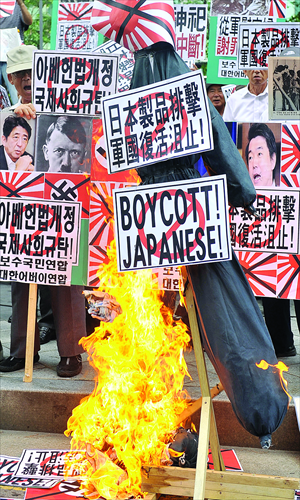Outrage over Yasukuni visits

South Korean protesters burn an effigy symbolizing Japan in front of the Japanese embassy in Seoul on Thursday during an anti-Japan rally to mark the 68th anniversary of the liberation from Japan's 1910-45 colonial rule. Photo: AFP
China and South Korea Thursday strongly condemned the visit to the controversial Yasukuni Shrine by three Japanese cabinet members and scores of lawmakers on the 68th anniversary of Japan's surrender in World War II, urging Japan to reflect on its history of aggression.
Three Japanese officials paid homage at Yasukuni, which honors Class-A war criminals, on Thursday. They were joined by 89 lawmakers, and another 101 lawmakers sent deputies to the shrine in their place, according to Tokyo-based ribenxinwen.com.
Japanese Prime Minister Shinzo Abe sent a deputy to visit Yasukuni, and made an offering from his private fund in his capacity as Liberal Democratic Party leader, Japanese broadcaster NHK reported.
According to NHK, Abe's deputy said he was told by the Prime Minister to mourn in his place and to apologize for his absence.
The Japanese politicians' visit drew immediate criticism from China, which summoned Japan's ambassador to lodge a strong protest.
Foreign ministry spokesperson Hong Lei said in a statement that regardless of whatever forms or names Japanese leaders' visits to the shrine take, their nature is to attempt to deny and glorify the militarism and history of aggression.
"We urge Japan to ... take concrete steps to win the trust of the international community, otherwise Japan's relations with its Asian neighbors have no future," Hong said, noting that the attitude of those in power in Japan toward historical issues concerns the political foundation of China-Japan relations.
South Korea's foreign ministry Thursday also called the visits "deplorable," saying they showed the ministers were "still keeping their eyes shut to history" and urging Japan to offer a sincere apology.
Marking the Korean Peninsula's liberation from Japan on Thursday, South Korean President Park Geun-hye said, "Japanese leaders should show their courageous leadership to heal the wounds of the past so that both countries can develop as true cooperative partners."
Japan's attitude toward its militarist past has long been a thorn in its relations with its neighbors, and the right-wing shift in Japan's political environment under hawkish leader Abe has made the situation more worrisome.
A Global Times reporter Thursday morning saw Japanese activists dressed in Imperial Japanese Army uniforms outside Yasukuni, and members of radical conservative groups lined up to visit the shrine holding banners carrying slogans such as "Greater East Asia War wasn't an invasion" and "Prime Minister Abe should visit Yasukuni on August 15."
Hundreds of members of the "Gambare Nippon" (Stand Firm Japan) carrying Japanese flags with black mourning ribbons marched to the shrine, where they sang the national anthem and shouted "Long live the emperor."
A small group of South Korean lawmakers who tried to protest at the shrine were hustled away by police after a scuffle.
In addition to the Yasukuni visits, Abe's skipping of a reference to remorse for the war has made Japan's neighbors more vigilant.
In a speech on the anniversary, the hawkish premier avoided words such as "profound remorse" and "sincere mourning" used by his predecessors in the past two decades. He also did not say anything like "pledging not to fight a war."
Liu Jiangyong, a vice director of the Institute of Modern International Relations at Tsinghua University, told the Global Times that Abe is trying to replace the "Murayama Danwa," a war apology statement made by former prime minister Tomiichi Murayama in 1995, with his own set of expressions on Japan's role in the war with a less apologetic tone.
Meanwhile, Abe's remarks were made to appeal to right-wing forces to make up for his absence at the shrine, Liu said.
Go Ito, a professor of international relations with Japan's Meiji University, told the Global Times that Abe is not interested in defusing tensions with China and South Korea now.
The China-Japan relationship has entered a very difficult time and will not see a breakthrough under Abe, Ito said.
The anniversary also stirred emotions among the Chinese public.
On Thursday, more than 50,000 threads were posted on Sina Weibo, China's Twitter like platform, vowing not to forget the national humiliation caused by Japan's invasion.
In Nanjing, East China's Jiangsu Province, historians, experts and people from all walks of life gathered at the Nanjing Massacre Memorial Hall, mourning the 300,000 people who died in the massacre and prayed for world peace. Some Japanese also joined in the peace rally.
In Taipei, dozens of demonstrators Thursday set fire to a giant model of a Japanese warship in a rally outside the Japan Interchange Association to vent anger toward Japanese politicians' visits to Yasukuni.
Agencies contributed to this story